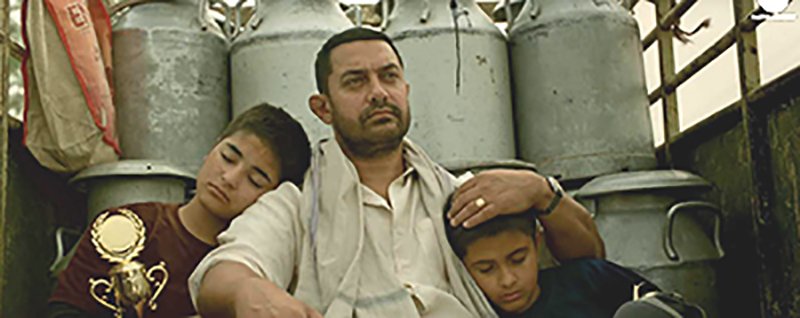
The opening scene of Nitesh Tiwari’s Dangal has a young Mahavir Singh Phogat priming himself up for an office brawl. He has left wrestling but we are told, wrestling has not left him. And so like a fighter in an akhada, he crouches, his eyes focused and unblinking and makes a little gesture to pull up his trousers so he can move unhindered. And in this infinitesimal moment, Aamir Khan takes you right into the soul of a man who is steeped in the pure joy of wrestling. After the bout, he extends his hand to his splayed opponent, reminding you of that moment in Dil Chahta Hai when he offered the same courtesy to a rival who had pushed him too far. When he cycles back to his village, you remember the young cycling champ of Jo Jeeta Wohi Sikander. When the David and Goliath analogy is invoked, you remember Lagaan and a pattern emerges of an actor who likes stories about unlikely winners and underdogs nobody thinks much of.
**
Be it PK or Rancho, you remember the characters who took on a world entrenched in dogma. But then Dangal is not about Aamir Khan. There is a hugely moving scene where his Mahavir, now aged and overweight…takes on his arrogant, young daughter. He has the fight but not the stamina. Watch him as he desperately pants for air, his jowly face ruddy, his body caving in and not a single precedent comes to mind where a leading male star was taken down by a young, unknown actor. Female to boot. You see a lot of frames where he has his bulky back to the camera as he waits for the right moment to move or to say something. Even in the final battle that Geeta Phogat (played admirably by Fatima Sana Shaikh) fights, the focus is not on him but her. Unlike a recent, supposedly feminist film where the climax served a male legend more than the women he was supposedly fighting for.
**
That said, this really is a film about a story worth telling. A story that goes beyond Bollywood’s slavish addiction to stereotypical pandering to male mythology and box office numbers. A story about an India that we rarely see in our films. An India where the antenna on the roof once upon a time needed to be moved by hand if you wanted to watch TV with clear transmission. Where luxury and privilege are just words and struggle is a way of life. An India that most assembly line plots produced by Yash Raj and Dharma (with a few exceptions) have no clue about.
**
This is a film that smells of the earth, swaying fields, cramped homes full of lacks and sacrifices from where so many of our sports stars emerge with fire in their bellies. Homes where so many of us grew up in. And small town neigbouroods where our dreams collided with convention. The production design captured by cinematographer Sethu Sriram perhaps owes its unvarnished truthfulness to the fact that director Nitesh Tiwari is from Itarsi and not South Bombay. The writing is earthy too, the dialogue free from verbosity and the songs are situational and work well especially the opening track that takes us into the lives of unknown, impoverished wrestlers struggling to shine.
**
That we needed a film like this more than ever is clear from the fact that not far from Patiala’s Netaji Subhash National Institute of Sports, where Geeta and Babita Kumari trained to realise their medal dreams, is Bhathinda, where a pregnant dancer died recently after being shot in the head by a guest at a wedding function. After she refused to dance with him. In Uttar Pradesh too, a woman was beaten in public for resisting molestation. In a country where cinematic heroism is mostly a male prerogative, where in life and on the screen, the narrative about women centres around their anatomy rather than their spirit, Dangal treats women as fighters and not fantasies. Their bodies are not sexualised to titillate and we see their muscles brimming with power and more importantly we see their hearts that know no fear.






This is a wonderful review of the movie Dangal. Thank you Ma’am Reema for such a lovely take on the movie….!